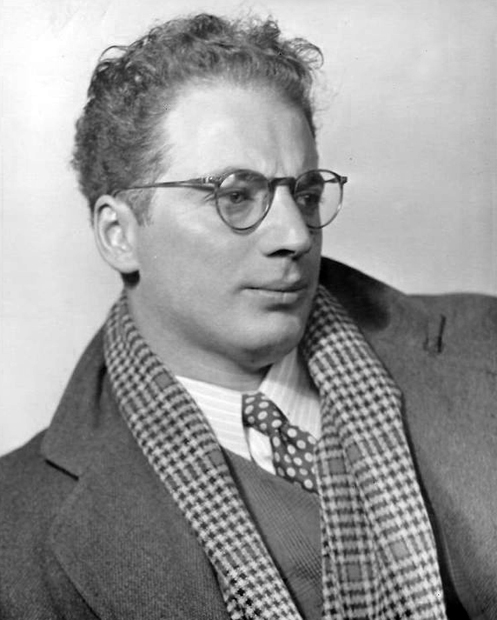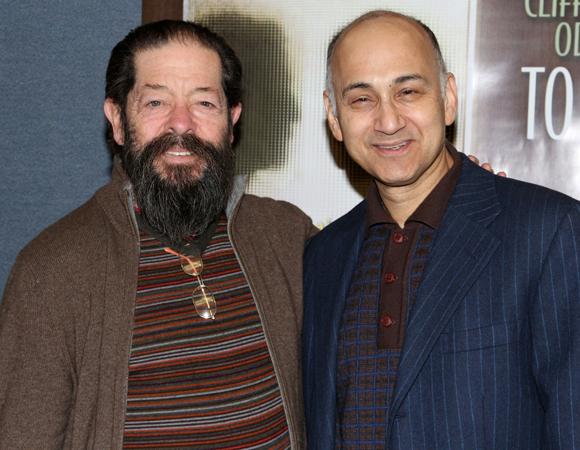Rocket to the Moon: Clifford Odets' Forgotten Masterpiece?
The drama is getting a rare New York City staging from Peccadillo Theater Company.

(© Carol Rosegg)
The story revolves around New York City dentist Dr. Ben Stark. Approaching middle age, Stark worries that his talents are being wasted in an unrewarding private practice. His father-in-law wants him to uproot to a ritzier neighborhood, but his wife, Belle, wants him to maintain a holding pattern. The arrival of an alluring and willful young receptionist, Cleo Singer, threatens to disrupt Stark's dismal status quo. He begins to wonder if his life could be different with her.

When I first mentioned the play to Odets, he was quick to pull out a quote from an interview his father gave to Herman Harvey near the end of his life, in which he was asked about his "irreversible commitment" as a writer:
I would like to make a statement about what in our American world develops the inherent possibilities of each man and woman and what holds them back, what stymies them. We pick up the techniques (conciliation, ingratiation) of selling ourselves. Such experience shrivels our souls.
"That's what Rocket is really about," Odets said. The play was right at the heart of everything his father cared about as an artist.
Now Rocket to the Moon is getting a rare revival from the Peccadillo Theater Company at the Theatre at St. Clement's. "It has essentially not been produced in New York for decades," said Peccadillo's artistic director Dan Wackerman, who is also helming this production. "There aren't too many plays of this quality or importance that haven't been revived in such a long time." For twenty years, Peccadillo's mission has been to produce lost gems of the American theater, so Rocket seemed like the ideal play.
Walt Odets also feels like his father's work is particularly timely in 2015 America. "We're back in the same situation we were in during the depression," he contended. The kind of social and economic imbalances that my father wrote about are back."

(© Carol Rosegg)
Odets developed a reputation for infusing his plays with fiery political rhetoric and passionate calls for social justice, illustrated in his hit shows Waiting for Lefty and Awake and Sing! Outwardly, Rocket seems to be a world apart from those earlier works, disconnected from politics and more concerned with the inner lives of its characters. Wackerman begs to differ. "It's actually quite political," he asserted, adding, "It's just that the politics are embedded in a highly complex emotional drama."
Odets biographer Beth Phillips concurred: "It's very political. It's about being trapped in the capitalist system. The individual is destroyed. That's what capitalism does. We settle." She added, "Arthur Miller felt this was Odets' best play." According to Phillips, the author of Death of a Salesman (winner of the 1949 Pulitzer Prize for drama) was tremendously influenced by Odets, and considering their shared interest in middle-class disappointment and middle-aged disillusionment, it's easy to see why.
Everyone in Rocket seems to be settling for something less than happiness, including Belle's wealthy father Mr. Prince. "He's not happy with his life, but he knows you have to blunder forward," said Jonathan Hadary, who plays Prince in the Peccadillo production. He's starring alongside Ned Eisenberg, who plays Dr. Stark. The two men have appeared in the last two major Odets productions in the city, both produced by Lincoln Center Theater: Awake and Sing! (2006) and Golden Boy (2012). They are seasoned veterans when it comes to finding the language and tone of Odets.

(© David Gordon)
Still, Eisenberg showed some trepidation in approaching the role of Dr. Stark, arguably one of the more inscrutable characters in the Odets canon. "He's an enigmatic character," Eisenberg admitted. "I'm still finding out where exactly he stands." But where he stands is something of an open question in the script. The play's infamously inconclusive ending has been a subject of debate among critics for years, with some citing it as one of the play's major flaws.
"Ben Stark is literally dumbfounded, unable to make a major decision about his life," Phillips noted about the ambiguous ending. Rather than seeing this as a structural detriment, Phillips views it as one of Rocket's great strengths. "He's stuck between a rock and a hard place. Most people can identify with that. It's also Odets' life story."
Like most people, Odets was forced to take work out of financial consideration. Starting in the 1930s, he began working in Hollywood, even though by all accounts he was incredibly ill-suited to screenwriting. "Screenplays are usually around a hundred pages long, but he would come in six months late with an eight-hundred-page script," Walt Odets remembered, adding, "and he couldn't have someone kill himself at the end of every movie, like he did with his plays. It wasn't what they did in Hollywood."
But Hollywood is where he would remain until his death in 1963. Walt Odets' older sister Nora was born with brain damage in 1945. In order to care for her in the manner he wanted, Clifford Odets continued to work for major film studios, which was far more lucrative than the stage. This led many to label the wayward dramatist a "sellout."
"A few years before he died at the age of fifty-seven, I remember him saying to his secretary, 'I'm trying to figure out what I want to be when I grow up,'" Walt Odets recalled. "Like Ben Stark in Rocket, I don't think he ever felt quite like he belonged anywhere.








